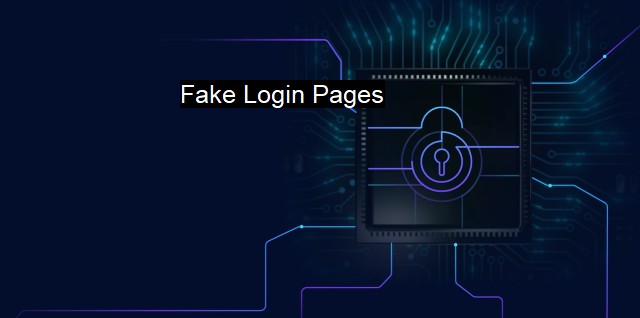What are Fake Login Pages?
Protecting Yourself from Cyber Threats: Understanding Fake Login Pages and the Importance of Cybersecurity Measures
Identity theft, phishing attacks, and hacking are not new; they've been part of the internet ecosystem for years. a particular type of security threat that has recently become more prominent is dubbed "Fake Login Pages." These are false website interfaces that trick people into providing sensitive information unsuspectingly.The origin of fake login pages lies in the field of website clonage, where one site mimics the design and structure of another. On the surface, it may appear to be the same as the genuine website, with the same colour scheme, images, text, and other design elements. But, there's a significant difference: the end goal of a cloned website is not to provide services or information but to engage users in a deceiving activity.
The trick with fake login pages is that at first glance, they appear legitimate. Users who are lured into the trap feel they're accessing a trusted site and are likely to enter login credentials without thinking twice. once the user hits the 'Enter' button, their confidential details such as emails, usernames, passwords, credit card information, bank details, etc., are forwarded to the hacker's servers without their knowledge.
Typically, these pages target well-known websites and online platforms like Google, Facebook, PayPal, Amazon, among others. The motivation is straightforward—such popular sites have immense user databases which, when exploited, lead to immense illegal gains. By impersonating trustworthy brands, cybercriminals can increase their success rate.
There are several ways how fake login pages surface. Sometimes, they come across through misleading advertisements on various online platforms. In other instances, they could reach the user through links embedded in phishing emails, prompting users to "verify account details," "claim rewards," or "reset the password."
While fake login page attacks create various cybersecurity risks, the most notable one is identity theft. Once the scam reveals the user's credentials, all the personal data becomes accessible to the attacker. And the implications of identity theft are severe—from unauthorized transactions, causing financial damages, even reaching to impersonation in social platforms potentially causing significant reputational harm.
Antivirus solutions play a critical role in a user's defense against this kind of threat. Quality antivirus software can flag and block these illegitimate login portals, often detecting them based on markers of known fraudulent sites, or by checking the website's unique signature via real-time scanning. These measures can help prevent hackers from accessing sensitive data.
Modern antivirus software also proactively alerts the user about suspicious activities on their system which might hint at cyber-attacks, thus improving the overall effectiveness of these software.
User vigilance and awareness equally count in addition to the right protection tools. The practice of checking the website URL before entering any credential is necessary. With https:// (the 's' stands for 'secure') usually present in the link of every secured landing page or website. Avoiding input of personal data on sites with unfamiliar or suspicious URLs can prevent falling prey to fake login pages.
Awareness of such phishing techniques and timely updates of antivirus software can decisively minimize the chance of falling for such scams. As prevention is believed to be the best cure—the same applies to cybersecurity. Combine tools like antivirus software with proactive awareness and prevent attackers from tricking you into revealing private information through fake login pages. one must accentuate the importance of keeping your guard up before it’s too late—the proactive approach is always the best in fighting the cybercrime.

Fake Login Pages FAQs
What are fake login pages and how do they work?
Fake login pages are fraudulent websites that mimic legitimate login pages to trick users into giving up their login credentials. Cybercriminals typically use phishing attacks to send users a link to a fake login page, which will then prompt them to enter their personal information. Once entered, the information is sent directly to the attacker, who can use it for malicious purposes.How can I protect myself from fake login pages?
To protect yourself from fake login pages, it's important to always be vigilant and cautious when entering your login credentials online. Never click on links or download attachments from unknown or suspicious sources. Always check the URL of any login page to ensure it's a legitimate website before entering your personal information. You can also use antivirus software to detect and block fake login pagesWhat should I do if I suspect a fake login page?
If you suspect you've landed on a fake login page, do not enter any personal information. Instead, close the page immediately and report it to the website or company being impersonated. You should also run a scan with your antivirus software to ensure your computer has not been infected with any malware.What can cybercriminals do with my login credentials?
Cybercriminals can use your login credentials for a variety of malicious activities, such as stealing your identity, accessing your financial accounts, or spreading malware to your contacts. It's important to keep your login credentials secure and unique across all accounts to prevent access by unauthorized individuals. If you suspect your credentials have been compromised, change your passwords immediately and monitor your accounts closely for any suspicious activity.| | A | | | B | | | C | | | D | | | E | | | F | | | G | | | H | | | I | | | J | | | K | | | L | | | M | |
| | N | | | O | | | P | | | Q | | | R | | | S | | | T | | | U | | | V | | | W | | | X | | | Y | | | Z | |
| | 1 | | | 2 | | | 3 | | | 4 | | | 7 | | | 8 | | |||||||